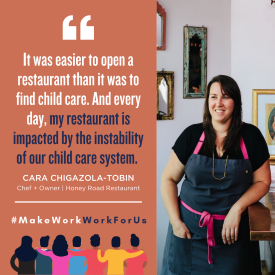 When the pandemic hit, Cara Tobin had a 7-month-old and a 4-year-old at home and was working 50-plus hours a week as the chef/owner of Honey Road in Burlington.
When the pandemic hit, Cara Tobin had a 7-month-old and a 4-year-old at home and was working 50-plus hours a week as the chef/owner of Honey Road in Burlington.
In the initial weeks, her husband cut back his work hours so Cara could be in the restaurant. But that was a short-term solution. “Eventually we had to hire more people in the kitchen because I had no child care and couldn’t be there,” Cara said.
As the pandemic wreaked havoc on the restaurant industry across the country, Cara’s business had to take on extra expenses because she and her employees were juggling parenting without school or child care.
“We only operate four days a week because we don’t have enough coverage; we’re constantly juggling each other’s schedules and child care needs,” Cara said. “Even with assistance from PPP loans and state grants, we’ve been losing money every week and every month.”
Cara put her infant on waitlists for child care programs before the pandemic started. A year and a half later she still hasn’t found a child care spot for the now 2-year-old. “Now we have him on lists for preschool for the fall of 2022,” Cara said.
The irony of all this is that Cara opened Honey Road with a vision to create a restaurant counter-culture that supports parents, especially women, to be able to balance raising a family with a career in the restaurant industry.
“I’ve been in the restaurant industry since I was 17. But I never saw examples of what it would be like to be a mother in the industry,” said Cara.
When she had her first child she was managing a kitchen at a restaurant in Boston and had worked 50-plus hours a week throughout her pregnancy. After the baby was born, Cara was back to work after only four weeks and all her vacation time was used up. “It was insane. I never saw my husband; we were hand-off parenting all the time,” Cara said.
When she decided to move to Vermont and open her own restaurant, Cara said: “I told my business partner, I want people to feel like they can have a family and they can still work in the restaurant industry.”
Cara designed her business so that employees have a lot more flexibility with their schedules than most restaurants allow. She also offers paid family leave (12 weeks for full time managers).
Cara is determined to do her part to change restaurant culture from the inside and make it a career where women can thrive. But she knows the only real way for women to succeed in the male-dominated restaurant industry is for public policies and societal expectations to change.
“The restaurant industry, like so many others, is desperate for workers. Public policies giving women and families access to paid leave and affordable, quality child care are key to our economic recovery and to empowering women to enter and succeed workforces that desperately need their talent and leadership.”

